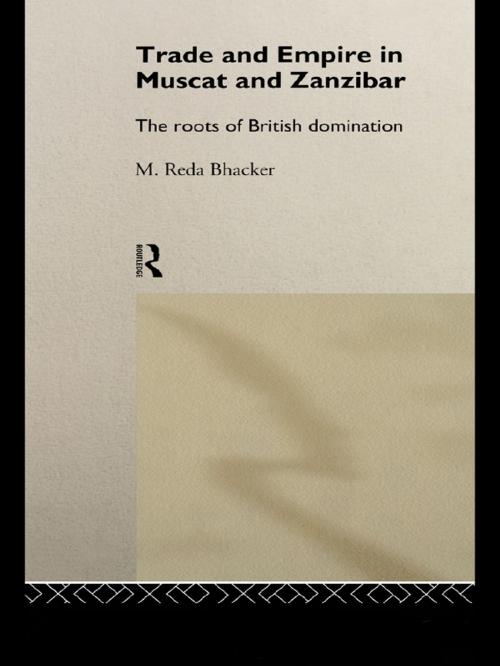Trade and Empire in Muscat and Zanzibar
The Roots of British Domination
Nonfiction, Social & Cultural Studies, Social Science, Cultural Studies, Ethnic Studies, Political Science| Author: | M. Reda Bhacker | ISBN: | 9781134895540 |
| Publisher: | Taylor and Francis | Publication: | November 1, 2002 |
| Imprint: | Routledge | Language: | English |
| Author: | M. Reda Bhacker |
| ISBN: | 9781134895540 |
| Publisher: | Taylor and Francis |
| Publication: | November 1, 2002 |
| Imprint: | Routledge |
| Language: | English |
M. Reda Bhacker looks at the role of Oman in the Indian Ocean prior to British domination of the region. Omani merchant communities played a crucial part in the development of commercial activity throughout the territories they held in the eighteenth and nineteenth centuries, especially between Muscat and Zanzibar, using long established trade networks. They were also largely responsible for the integration of the commerce of the Indian Ocean into the nascent global capitalist system.
The author, himself a member of an important Omani merchant family, looks in detail at the complex relationship between the merchant community and Oman's rulers, first the Ya'ariba and then the Albusaidis. He analyses the tribal and religious dynamics of Omani politics both in Arabia, where he looks especially at the Wahhabi/Saudi threat, and in Oman's sprawling `empire', with particular reference to Zanzibar where the Omani ruler Sa'id b Sultan had his court from 1840. His aim is to consider all Oman's overseas territories as a single entity, without the usual misleading compartmentalisation of African and Arab history.
Dr Bhacker finds that despite their prestige and influence in the region neither the merchant communities nor the government were able to respond to Britain's determined onslaught. Bhacker traces the local and regional factors that allowed Britain to destroy Oman's largely commercial challenge and to emerge by the end of the nineteenth century as the commercially and politically dominant power in the region.
M. Reda Bhacker looks at the role of Oman in the Indian Ocean prior to British domination of the region. Omani merchant communities played a crucial part in the development of commercial activity throughout the territories they held in the eighteenth and nineteenth centuries, especially between Muscat and Zanzibar, using long established trade networks. They were also largely responsible for the integration of the commerce of the Indian Ocean into the nascent global capitalist system.
The author, himself a member of an important Omani merchant family, looks in detail at the complex relationship between the merchant community and Oman's rulers, first the Ya'ariba and then the Albusaidis. He analyses the tribal and religious dynamics of Omani politics both in Arabia, where he looks especially at the Wahhabi/Saudi threat, and in Oman's sprawling `empire', with particular reference to Zanzibar where the Omani ruler Sa'id b Sultan had his court from 1840. His aim is to consider all Oman's overseas territories as a single entity, without the usual misleading compartmentalisation of African and Arab history.
Dr Bhacker finds that despite their prestige and influence in the region neither the merchant communities nor the government were able to respond to Britain's determined onslaught. Bhacker traces the local and regional factors that allowed Britain to destroy Oman's largely commercial challenge and to emerge by the end of the nineteenth century as the commercially and politically dominant power in the region.















